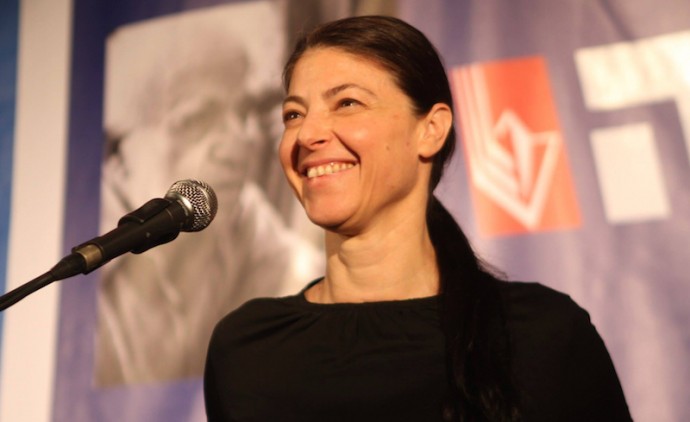Merav Michaeli, the Israeli journalist-turned-politician now serving in the Knesset as a member of the opposition Labor Party, is an antidote to the lament of the death of liberal Zionism. At a time when the moribund state of the Israeli left is frequently taken as a fixed truth, Michaeli aims to revitalize it—by asking Israelis to reckon with their own ghosts, to demand that their leaders take responsibility for the power they wield, and to get over what she calls a “competition over victimization.”
In an hour-long interview conducted while she was in Washington last month for the Saban Forum—an annual, mostly off-the-record confab of politicians and policymakers—Michaeli was insistent that the will exists to make peace with the Palestinians. The result might not be a two-state solution, she maintained, but “anything Israelis and Palestinians can agree on is a good agreement.”
Our conversation took place just days before the announcement of a center-left coalition between the Labor and Hatnua parties, which polls show competing in a tight race with the ruling Likud in upcoming elections.
While many have written the obituary for the two-state solution, Michaeli told me there are “a lot of creative ideas and initiatives that are grassroots and growing now in Israel for different kinds of solutions,” including a federation structure, like a “small EU,” or cantons in Israel and the West Bank, such as the member states of Switzerland.
Michaeli, 48, was first elected to the Knesset in 2013. When she made the transition from journalism to politics, she described her new calling as “the space in which there is power to create a reality, to change reality, to have an influence.”
In a way, Michaeli invites comparison to Barack Obama: a writer and activist who saw an opening to make good on the promise of social justice and leadership in politics, one who doesn’t scold about inequality, but presents a hopeful vision for a more equitable future.
But Michaeli—unlike Obama of the mid-2000s—does not offer up illusions that change is quick or easy, particularly for the Israeli-Palestinian conflict. “People are looking for a savior,” she told me. But that, she said, too often results in a “new politics for five minutes.”
She spoke about Israel’s failure to reckon both with the Holocaust and the Nakba (the Arabic name for the deaths and expulsions of Palestinians and destruction of Palestinian villages at the founding of Israel).
“We never caused that on purpose, but there is a tragedy that our resurrection, almost, as a people went hand in hand with some destruction for the Arab citizens of Israel and of course for others who are not Arab citizens of Israel,” she said.
Michaeli welcomed criticism of Israel from American Jews, adding, “I identify with this criticism.”
“I’m happy,” she said, to have “support in my struggle for what I see as the Israel that I want to live in and I want to reconstruct as a democratic state that is the homeland of the Jewish people but allows all of its citizens to live peacefully together with equal rights.”
While a certain conventional wisdom has taken root in some circles that the Israeli public has moved inexorably to the right, Michaeli rejected the notion that the Israeli public has become more right-wing. The Israeli journalist Gershom Gorenberg similarly has disputed that conventional wisdom, noting recently that despite the myth, in the 2013 elections, “Likud and the right as a whole shrank; the left grew.” Prime Minister Benjamin Netanyahu might have won reelection, but “just barely, and was forced into a coalition that he despised and that lasted only a year and a half.”
Under Netanyahu’s leadership, the government has exploited fear, substituting a “blame game” for real security, Michaeli said.
“The blame game has become the essence,” she added. “What started as a tactic has become the essence.”
On the domestic front, Michaeli has championed reforms that go to the heart of Israel’s conflict between being a Jewish state and a democratic one. She has pressed for taking marriage out of the hands of religious authorities and making it a civil matter. Current law recognizes marriages between Jews only if performed by an Orthodox rabbi acting under the authority of the Chief Rabbinate, even for secular, Reform, Orthodox, or Reconstructionist Jews. Interfaith marriages between Jews and non-Jews are not permitted by the Jewish religious authorities (or by Muslim and Christian authorities).
Aharon Barak, a former chief justice of Israel’s Supreme Court, has written the current law “does not only violate the constitutional derived right to marriage, but it also often violates the derived right to freedom of conscience and freedom from religion.”
On economic issues, Michaeli lambasted Netanyahu for “clinging to the almost religious faith that growth will trickle down,” when “the gaps have only been growing and growing.” She noted that half a million Israelis took to the streets in 2011 to protest growing economic inequality.
But it’s on the ghosts that stymie a resolution of the Israeli-Palestinian conflict that Michaeli is at her most philosophical. She’s no wide-eyed idealist; she acknowledged to me that it’s “difficult” to make the argument that a peace agreement with the Palestinians will improve Israel’s security situation “because people don’t trust it.” This is due, in Michaeli’s view, to the “blame game” and the exploitation of fear.
The Labor Party, she said, should be able to create a bloc to “take responsibility and not blame the others.”
But at the core of everything Michaeli talks about is the failure on the part of Israelis to acknowledge that both parties to the conflict—Palestinians and Israelis—are refugees. By failing to acknowledge the Nakba, they refuse to acknowledge that the Palestinians also are refugees.
Oddly, too, she says, Israelis don’t recognize themselves as refugees. In its early days, Israel hoped to bury the image of a meek Jew going “like a lamb to slaughter” in the Holocaust in favor of the image of the strong, muscular Israeli. (Michaeli’s grandfather, Israel Kastner, who negotiated the rescue of over 1600 Hungarian Jews from the Nazis, was gunned down in Tel Aviv in 1957, accused of being a Nazi collaborator.) Today, she said, Holocaust survivors are treated as “saints” (even though many are left to live in poverty) and the Holocaust remains at the core of Israel’s “collective identity as a victim.”
But still, there remains an unresolved contradiction between wanting to undo the image of Jews as passive Holocaust victims while still clinging to that same tragic era as ongoing evidence of Israel’s victimization.
Michaeli questioned why, nearly 67 years after Israel’s founding, it now needs the so-called Nation State Law that would, if passed, define Israel as a Jewish state. The Israel Democracy Institute’s monthly Peace Index poll found that 64% of Israelis (61% of Israeli Jews and 77% of Israeli Arabs) “think Netanyahu brought the Nation State Law to a vote mainly to boost his popularity with the right-wing and settlers.”
“We must get back in power,” said Michaeli, and “we must legitimize attempts to reach a solution with the Palestinians.” She worried that the longer the conflict is unresolved, the more the conflict will become a religious one.
“It won’t happen overnight,” she said of a resolution, but “it’s totally doable and totally our responsibility.”





